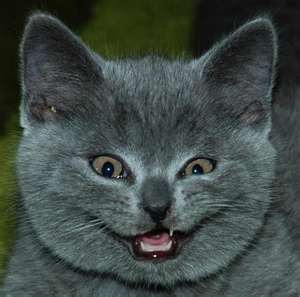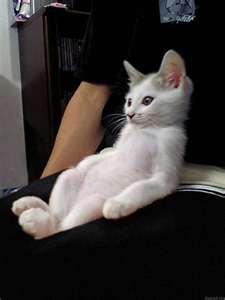What a beautiful kitty! 😉
When your cat misses you
24 Nov 2011 Leave a comment
in Uncategorized Tags: cat missing you, feline behaviour
Cats are very subtle creatures: a dog may look depressed, howl, display anxiety when missing his/her owner (peeing on carpets, chewing stuff, being very fearful etc.). Cats are more difficult to read… consequently, humans tend to think that their pet has not missed them; how wrong!
While looking after cats, I have noticed a few tell-tale signs, which I’d like to share with you now. Invariably, the first couple of days are fine; Cat may look slightly amused by Pet Carer presence. Some even sit there and watch you slave around 😉 others may be more vocal and request explicitly food or cuddles, either by sitting by their bowl or purring. Invariably the absence of Mum/Dad, if tolerated, is noticed and resented after the third/fourth day. How dare you, by the way, just leave Cat like that? Per Carer may be competent and a temporary source of food/cuddles, but it’s not the same 🙂
Some cats will poo in unexpected places, or make a mess of the litter (I swear). I once looked after a kitty who seemed to create all sort of diversions to make the point: litter, food, rolls of toilet paper everywhere. He then sat there watching me clean up (he seemed to smile). Sometimes I find them curled up on Mum’s/Dad’s favourite sweater/clothes, or on the bed, distinctly on one spot. Other times, they look at you and they ‘miaw’ and they seem to say:’when are they coming back?’.
Cat owners report that Cat ‘punishes’ Mum/Dad for absence displaying various behaviours such as being out of reach, peeing/pooping out of the litter and scratching furniture; or simply sulking. But, see what happens when Owner punishes cat 🙂 :
Dunbar (1988) noted that if a cat owner sees a cat performing a forbidden act such as scratching the furniture, punishment is not usually effective. If the human punishes the cat, the cat merely learns to avoid the human (so the human becomes an S-). Typically the cat will continue to perform the same forbidden act when the human is not present. If the human discovers evidence of a cat’s forbidden behavior upon coming home, and punishes the cat, the cat learns to hide when the human comes home. This does not mean the cat feels “guilt.” It means the cat has learned that the human does unpleasant things when first arriving home. The cat does not associate punishment with the forbidden behavior, which typically occurred much earlier.
Cats are often misunderstood, in my opinion. They may be more reserved and independent than dogs perhaps, but that doesn’t mean that they are not fiercely loyal to their family; I personally think that they are only a bit less obvious than other pets perhaps 🙂
The healing power of pets
13 Nov 2011 Leave a comment
in Uncategorized Tags: healing powers of pets
Emotionally speaking, having a pet companion makes a huge difference for us humans: pets seems to be able to relax and make us happy with their presence. They also have healing properties, and this is recognised by the medical profession, who now allow pets to visit patients in hospital (they seem to recover much quicker).
This doesn’t surprise me. The healing process is operated by the body itself, and not by external intervention; yes, medicines can help fight infection and support the body, but it’s the body itself that does the ‘job’, so to speak. So if we are in an emotional/mental state of relaxation and contentment, it’s more likely that we will allow the body to use its energetic resources to fight illness or to support recovery, rather than to create tension.
A friendship with an animal is devoid of all the trappings we silly humans are victim of; the animal sees us for what we really are ‘inside’, emotionally and mentally. An animal ‘senses’ us. Have you notices how pets seem to know instinctively who they can trust? It’s not by pure chance 😉
I have found some interesting articles about pets in hospital and the healing powers of pets if you want to expand the subject. I am sure, as pet owners, you have a lot yourself to tell. I can say, personally, that my cat seems to sense my modes and if I am sad, she sits next to me, ‘looking after’ me. I find her presence incredibly reassuring and soothing, and I tell you she’s not the most cuddly of cats 🙂
Enjoy the reading!
http://www.ehow.com/facts_5300398_healing-power-pets.html
http://www.ehow.com/how_5949717_train-pet-visit-hospitals.html
http://www.drmartinwilliams.com/healingpets/healingpets.html
What’s the password?
11 Nov 2011 Leave a comment
in Uncategorized Tags: computer cat

…now down to work! Enough with the chatting 😉
Cat hairballs
08 Nov 2011 Leave a comment
in Uncategorized Tags: cat care, cats, hairballs, remedies, vet
Due to their grooming habits, cats will often develop hairballs: this will cause vomiting and sometimes constipation. How to avoid this problem?
The most obvious thing to do is to arm yourself with a good brush 🙂 and brush your cat as regularly as you can… if this fails to sort the problem out the next step is to perhaps change your cat’s diet to a diet very rich in fiber. This should ease things internally (at least on the constipation front…), and help the elimination of hairballs. Wet food instead of dry food also helps.
Homemade remedies I have heard of are butter (a couple of times a week) and canned pumpkin (to be mixed to your cat’s dry food).
Hairballs are tricky, because they do happen; cats love grooming! Hopefully the above remedies might help.
Note: do consult a veterinarian before using any of the above suggestions; I am not a veterinarian and this is not information from a qualified medic.
Children and pets
06 Nov 2011 Leave a comment
in Uncategorized Tags: animals, children, pet care, pets, pets in the home
Giving your child a pet, i s in my opinion one of the best things a parent can do, to help their child’s emotional and spiritual development.
s in my opinion one of the best things a parent can do, to help their child’s emotional and spiritual development.
Interacting with an animal can teach the child to care and provide for others, and sense of responsibility (said that, in our household, guess who cleans the litter, usually…).
A friendship with a pet has magical aspects; we always had out cat Kitty, but over the years our house has hosted hamsters, dwarf hamsters, fish, terrapins and the many guest dogs who came to sleep over through Elena’s Cat Care (I used to do much more dog walking and dog boarding). In fact, I can say to you that, originally, my venture in pet care started because my daughter wanted a dog; I put an ad on Gumtree and Puppy arrived, a lovely dachshund whom I looked after three days a week. I then had the idea to provide petcare in the pet’s home, and Elena’s Cat Care was born 🙂
I myself loved animals as a child, and as we lived in the countryside there was never a shortage of dogs, cats and all sorts: horses, rabbits, hens and of course the wild life in the nearby fields and forests. It was a great experience, and although we now live in London, I have always tried to make my children aware of nature and animals.
Here are a few articles on children and pets, that I think may interest you 🙂
http://www.myparentime.com/articles/05/article462.shtml
http://www.messaggiamo.com/articles/44753-kids-and-pets-will-it-work.html
http://ezinearticles.com/?Children-and-Pets-Do-Well-Together&id=3859497
Why do cats purr?
02 Nov 2011 Leave a comment
in Uncategorized Tags: cat care, cats, grooming, happiness, purring
Interesting question. The obvious answer would be, ‘because they are happy’. Cats do indeed purr to express the emotion of happiness, but interestingly research shows that purring may have other functions.
There isn’t a definitive answer to how purring is produced, as there isn’t a specific organ allocated to this function: it is believed that the vibration is produced by the larynx.
Cats do purr when petted by humans, but not only. They are known to purr when grooming each other; when nursing their kittens; kittens purr when they feed! It seems that cats use purring as a mean of communicating their feelings with each other and the young.
Research shows that purring may even have healing properties according to this Scientific American article 🙂
http://www.scientificamerican.com/article.cfm?id=why-do-cats-purr



